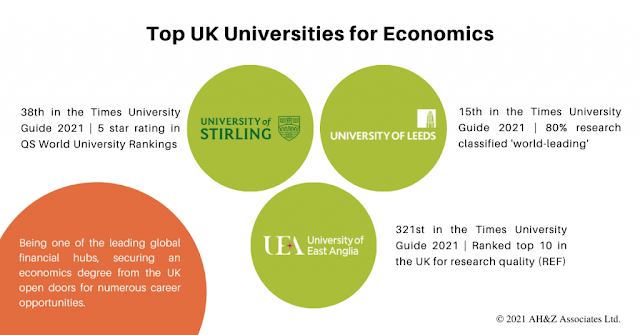London is one of the world's most important financial
cities, and studying economics in London, which
is close to the birthplace of many of the field's theories, can be a
significant advantage for any international student. Economics is a subject
that helps people comprehend the world around them. It allows people to better
understand people, businesses, markets, and governments, allowing them to
respond more effectively to the challenges and opportunities that arise as
things change. Economics majors are well-positioned in an ever-changing world
because they possess problem-solving and analytical skills that enable them to
succeed in a variety of fields, including law, risk management, actuarial
science, finance, foreign affairs, public administration, politics, policy
analysis, health administration, entrepreneurship, market analysis, journalism,
and unknown future careers. Moreover, an economics degree's breadth and
flexibility prepare students to adapt to unanticipated developments and seize
unexpected opportunities. If you want to learn more about studying Economics in the UK, read the full article.
Theories of
Economics
You can study many different aspects of economics. These can
be examined at both the macroeconomic (large-scale) and microeconomic
(individual) levels. There are four types of Economic system. They are:
❖
Traditional Economic System
❖
Command Economic System
❖
Market Economic System
❖
Mixed Economic System
Reasons of
Studying in the UK
Economic theory is a social science that investigates how
individuals, groups, and nations manage and use resources. Microeconomics,
which examines individual actions, and macroeconomics, which is concerned with
the economy as a whole, are two branches of economics. Both schools of
economics forecast how markets will act in the future and how to increase
efficiency in the present.
❖
Understand the World We Live in: Economics will give you insight
into issues such as taxation, inflation, and interest rates, all of which have
an impact on our daily lives. A degree in economics aids in the discovery and
comprehension of current real-world situations. People who study economics will
gain an understanding of how individuals and organizations make decisions and
forecast future changes in the world. Furthermore, from how much we spend for
goods and services to how much employees are paid, economics has a role. When
you study economics at university or in high school, you gain a new perspective
on the world and how it works.
❖
Successful Career: People with an Economics degree are
better problem solvers and decision makers, which helps them succeed. Econ is
well-known for its well-managed employment market. You can work as a
stockbroker, economist, consultant, data analyst, statistician, market research
analyst, credit analyst, business development, and so on with an economics
degree.
❖
Desirable Transferable Skills: A degree in Economics will provide
you with a set of abilities that will enable you to apply what you've learned
in class to real-world problems. A wide range of employers’ value and seek out
the transferrable abilities you gain from studying Economics. You'll develop a
distinct method of thinking that you may use to solve challenges in everyday
life. Employers value a variety of qualities, including critical thinking,
communication, problem-solving, and analytical skills.
❖
Preparation for Graduate School: If you're thinking about getting a
graduate degree in business, learning economics will help you out. Economics
will give you problem-solving abilities that will help you succeed in an MBA
school. You would have established clear reasoning and logical thinking skills
after taking multiple Economics courses. Furthermore, statistics show that
Economics students routinely have one of the highest average LSAT scores among
all majors, which is good news for those of you who want to go to law school.
Benefits of Studying Economics in the UK
International students will find some of the best ranked UK universities after coming here. Here are five of the most important benefits of studying economics and how they can improve both your company and your career:
❖ Expand Your Vocabulary: An economics course will offer you fluency in essential terms needed to comprehend how markets work, whether it's scarcity (limited resources), opportunity cost (what must be given up to acquire something else), or equilibrium (the price at which demand equals supply). Even if you don't use these terms frequently in your current job, learning them will help you have a better knowledge of market dynamics in general and how they apply to your company.
❖ New Terms into Practice: Economics is more than simply a series of fancy phrases; it's about applying them to create a viable company strategy. When you know what these phrases mean, you may utilize theories and frameworks like Porter's Five Forces and SWOT analyses to evaluate circumstances and make economic decisions for your company, such as whether to pursue a bundled or unbundled pricing strategy or the best ways to optimize revenues.
❖ Own Spending Habits: Economics will not only teach you about your company's and market's behavior, but it will also teach you about your own spending habits and ideals. Willingness to Pay (WTP), for example, is the highest price someone is willing to pay for a product or service. The difference between hypothetical and actual WTP is common, and understanding it will help you decipher your own behavior and make economically sensible judgments.
❖ Nuances of Economic Field: Many people mistakenly believe that economics is only about curves, models, and correlations, but it is considerably more complex than that. Much of economic theory is predicated on the premise that people act rationally, but it's crucial to know what to do when those assumptions are proven false. Learning about the cognitive biases that influence our economic decision-making processes gives you the tools to forecast human behavior in the actual world, whether rational or illogical.
Career for
Economics Graduates
Economics majors learn to collect, analyze, and understand
data while doing calculations using mathematical formulas and statistics. They
also develop models to forecast the effects of investments, governmental
decisions, industry trends, demography, climate change, and a variety of other
factors. Because of this knowledge When deciding on a professional path with an
economics degree, here are some alternatives to consider.
❖
Market Research Analyst: Market research analysts use their
understanding of industry trends to predict how products or services will
perform in different economic climates. They are taught how to plan research as
well as gather and analyze data, just like economics majors. They must be able
to quantify outcomes and deliver this data to clients.
❖
Economic Consultants: Economic consultants conduct
analyses on economic possibilities using analytical and research skills. They
research industry trends in order to assist businesses in improving their
performance. They could work for a range of companies in a variety of areas,
such as business, finance, healthcare, education, government, and so on.
❖
Business Reporter: Reporters specializing in business
and economics conduct research, compose stories, and broadcast them on business
leaders, firms, industry trends, economic changes, and financial markets. They
are, in essence, continual students of economics in the modern world.
❖
Credit Analyst: Credit analysts undertake
microeconomic evaluations of potential clients to determine the risks
associated with lending money to them. They consider economic trends as well as
factors affecting the location, industry, and competitors of potential clients.
UK
Universities Offer Economics Degree
After deciding to study Economics in the UK, the first
question that arises in international students’ minds is which
is the best place to study Economics and why UK is a good place to study Economics? Some UK universities which offer
Economics are:
❖
University of Cambridge
❖
London School of Economics
❖
University of Warwick
❖
University of Greenwich
❖
Lancaster University
❖
University of Durham and many more
In the end, those interested in pursuing an economics
education have a variety of possibilities. You may choose to pursue an
undergraduate or graduate economics degree depending on your personal and
professional goals, your present stage in life, and other significant criteria.
Having a full understanding of how markets function, pricing strategy, and
consumer behavior is critical to success, whether you're a newcomer to the business
world or a seasoned executive.


Comments
Post a Comment